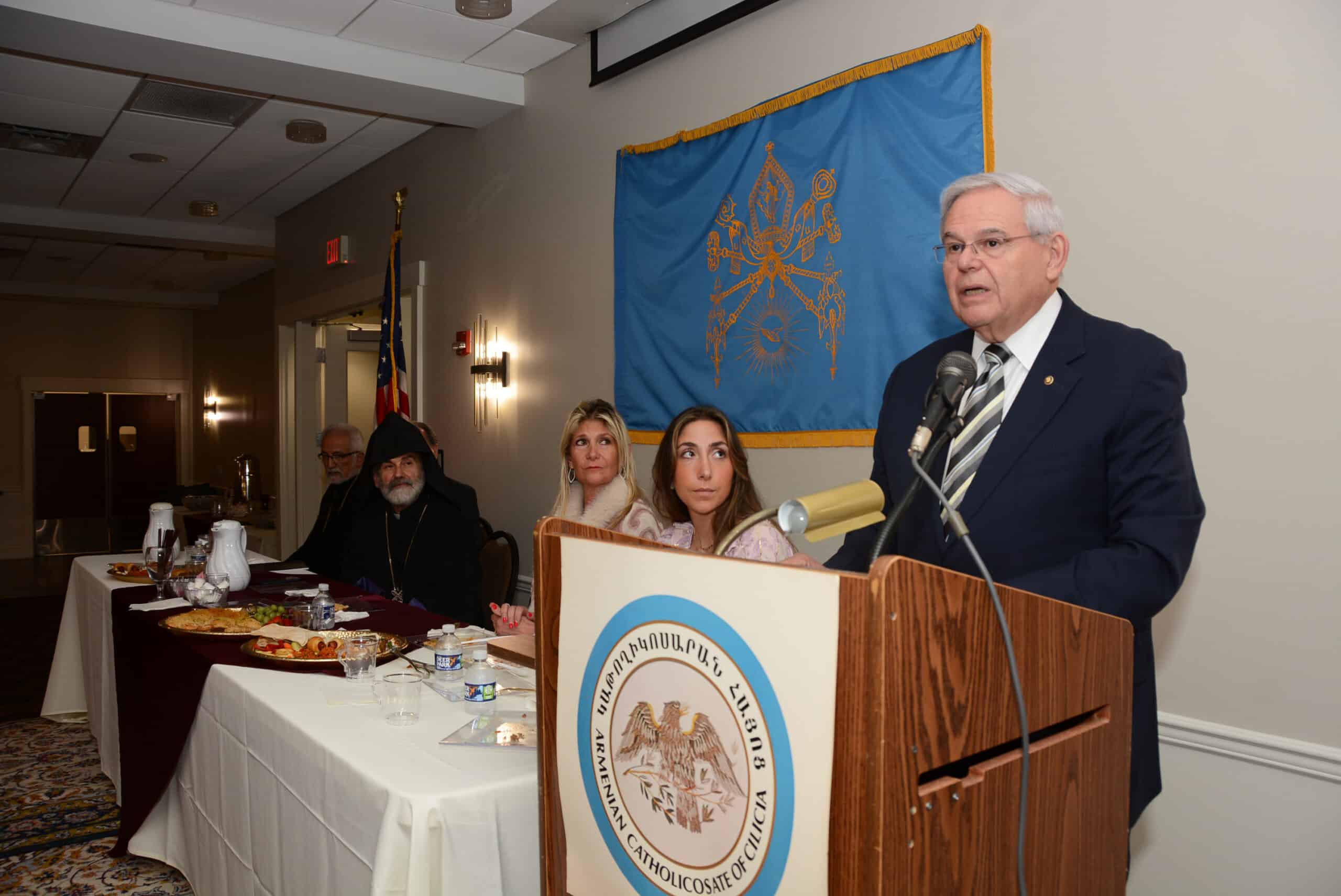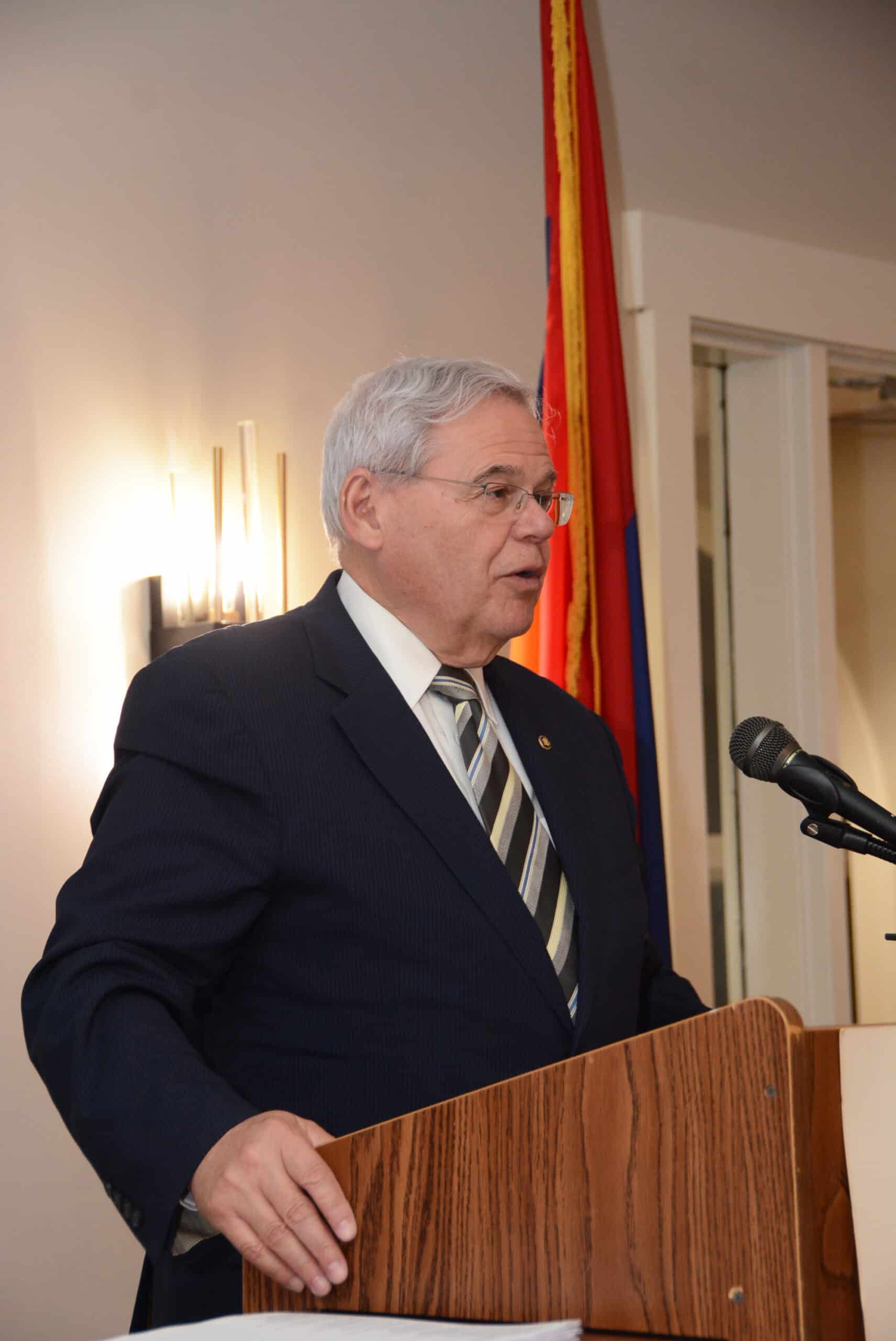SEN. MENENDEZ: “THE CAUSE OF THE ARMENIAN PEOPLE IS CLOSE TO MY HEART”

 Senator Bob Menendez addressed the reception held at the National Representative Assembly of the Eastern Prelacy in Philadelphia on Friday, May 13, with a speech in which he looked back at the years of hard work, finally crowned by the recognition of the Armenian Genocide by the United States. The Armenian cause, he said, was close to his heart.
Senator Bob Menendez addressed the reception held at the National Representative Assembly of the Eastern Prelacy in Philadelphia on Friday, May 13, with a speech in which he looked back at the years of hard work, finally crowned by the recognition of the Armenian Genocide by the United States. The Armenian cause, he said, was close to his heart.
“A little over a year ago now, I remember feeling the triumph and indeed the vindication – as many of you must have felt, when I heard President Biden was planning to recognize the truth about history,” he said. “For so many of you this was deeply personal, and I remember how proud I felt to have been a part of such an important movement for justice by leading this effort in Congress.”
Sen. Menendez, Chairman of the Senate Foreign Relations Committee and one of the staunchest supporters of the Armenian people and Armenia among U.S. politicians, expressed his gratitude for the “Spirit of Armenia” award bestowed upon him.
“With twenty-two churches represented this evening, it is humbling to be honored by you tonight in this holy place with the Armenian Spirit Award,” he said. “It is especially gratifying because the cause of the Armenian people is a cause close to my heart.”
He recalled his fight for the Genocide recognition since he entered the Senate in 2006. “I even blocked nominees from their positions because of their refusal to call the genocide by its true name.”
Sen. Menendez mentioned he had told “both Republicans and Democrats we could not stand idly by as Turkey continued to cover up this crime.” The resistance encountered along the way could be daunting: “Turkey hired PR firms and lobbyists to influence American policy” and even “threatened to close American military bases.”
This resulted in Turkey’s President Recep Tayyip Erdogan criticizing Sen. Menendez personally, calling him “an enemy of Turkey.” This “must have been,” he said, “because I want justice for the Armenian people,” as well as an end “to threats and denials” by Turkey. “I want an American foreign policy based on the truth.”
Sen. Menendez noted that in three decades of diplomatic relations between the U.S. and Armenia, recently celebrated with the participation of Armenia’s Foreign Minister Ararat Mirzoyan, ties between both countries had become stronger.
Yet there is much more to be done, he said. “We discussed the importance of protecting the safety and security of all Armenians,” the senator said about his meeting with the Armenian Foreign Minister.
“But as much as we have achieved together, there is still much to do,” he added. “Just a year and a half ago, Azerbaijan’s war in Nagorno Karabakh, with Turkey’s full backing, took a painful toll on civilians.”
Sen. Menendez expressed his dismay over the “appalling human rights abuses” committed by Azerbaijan. “Baku continues to hold Armenian prisoners of war in their jails.” He promised to continue scrutinizing the U.S. Administration assistance to Azerbaijan.
He expressed his concern about how U.S. policies may impact regional geopolitics. “We cannot upset the military balance or impact peace negotiations,” he said. “That’s why I commissioned a Government Accountability Office report.”
More accountability of U.S. assistance to Azerbaijan was needed, he said. “When Secretary of State Blinken testified before the Senate Foreign Relations Committee I specifically pressed him on this very issue, because even today, the Armenian people continue to face threats that cannot go unanswered.”
At a time when “authoritarian regimes threaten democratic nations and principles around the world,” teaching about genocide is vital. “I know education is important to Archbishop Tanielian, who I had a chance to speak with recently,” Sen. Menendez said. “And I know education is important here at St. Gregory the Illuminator Church,” he added, referring to the church hosting the Assembly.
“We must teach our children, and the world, the truth.” This was critical to confront modern-day atrocities such as those committed against minorities like the Rohingya or the Uighurs, he said. “When the Ottoman Turks carried out their crime against the Armenians, they didn’t only evict them from their homes and send them to the desert for elimination,” he continued. They destroyed ancient monasteries and villages; they decreed that mountains and rivers and towns that used the Armenian language should be renamed in Turkish; they tried to erase an entire people and their proud history.”
In his closing remarks, he called on “those who are descended from the brave survivors of this genocide,” to keep their “memories alive.” He also urged “not to give up hope” to those whose loved ones “live in the shadow of violent dictators willing to rewrite the map using tanks and bombs.”
And finally, “to those who bow their heads here in Philadelphia and across the country, pray for the cause of peace around the world.”
